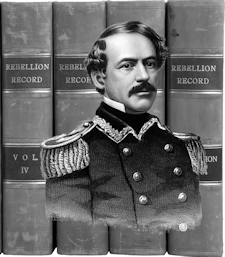February 1, 1862. — Day was rainy, but towards evening the clouds cleared away somewhat and I started for General Porter’s headquarters with all my bags and baggage. Such mud I never saw before. Up to, and over at times, the hubs of the wheels, came the nasty fluid, completely hiding all the holes into which our unfortunate carriage slumped. However, I finally surmounted all my troubles and reached General Porter’s quarters at Hall’s Hill. The general was not in, but his Assistant Adjutant- General, Captain [Frederick T.] Locke, was very kind to me, and invited me to stay and dine with him, saying that they were not quite ready to receive me as my tent had not come, which he had sent for. I then went over to my regiment, the 18th, and reported to Colonel [James] Barnes. He was in his tent and seemed quite pleasant and gentlemanly. He introduced me to Lieutenant Colonel [Timothy] Ingraham, and to Surgeon Holbrook. He then sent for my captain, [Stephen] Thomas, of Roxbury, who used to be connected with the iron foundry near the Hogg’s Bridge. The colonel remarked that he was somewhat inclined to be fat, in which remark I entirely coincided when I saw him. He seemed as if he might be a very smart officer, however, notwithstanding his size. I found him a regular specimen of a smart, good- natured Yankee, somewhat illiterate to be sure, as one could tell from his conversation, and also I should judge from his writing, if the specimens I heard of it were correct. Stockings, according to his dialect, is spelled “storkings,” shoes, “shues.” However, he can make himself understood, I suppose, and that is the main thing. Captain Thomas introduced me to my lieutenant [Woolbridge R.], Howes, a boat-builder from New Bedford, and a polite, well-educated man. I took up my quarters in his tent, and put my servant, James, in there too. I borrowed a bedstead from one of the officers, and prepared to make myself comfortable. We also had the fifer of our company (D) in the same tent. The tents of the regiment are a gloomy sort of concern, being the French bell- tent, with no floors. I got on first-rate though, and passed a very comfortable night.
I left home January 29, and reached Washington, January 30. I met Bill Perkins here, and set out with him on January 31, to go to camp, but broke down on the way.










